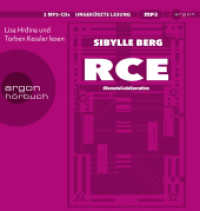- ホーム
- > 洋書
- > 英文書
- > Business / Economics
Full Description
Meaningful Stakeholder Engagement (MSE) is both a concept and a management approach, drawing on a combination of theoretical and applied knowledge areas (e.g., impact assessment, business and human rights, and stakeholder theory). MSE has become a key element of corporate sustainability risk-based due diligence as a process that responsible business enterprises are expected to apply to identify and manage harmful impacts on the environment and society.
Despite the obvious and growing relevance of meaningful stakeholder engagement, few publications have tried to synthesize the knowledge, academic literature, and practical experience within and around the concept and practices. This volume responds to that knowledge gap through the provision of comprehensive interdisciplinary perspectives. Embodying a rights-holder orientation, The Routledge Handbook on Meaningful Stakeholder Engagement emphasizes the importance of MSE for stakeholders who are or can be affected by activities driven by external actors, such as natural resource extraction or processing; infrastructure; development proposals, planning and implementation; and production for industry or consumption.
This handbook offers four thematic sections, all interdisciplinary in character, seeking to explore the multiple aspects of MSE. Moreover, a comprehensive introductory chapter explains key elements of the concept and causes for the current surge in expectations of MSE, including a rise in demands of risk-based due diligence. More than 40 international contributors combine theory and practice in chapters that discuss and elaborate the theory and practice of MSE. Uniquely, each section includes short practice notes based on experiences or dilemmas lived by practitioners or affected people, placing real-life situations into theoretical context. The concluding chapter draws up key insights from the chapters and practice notes, and casts a path for the future of MSE integrating values, norms, and practice.
Cutting across multiple disciplines including stakeholder theory, natural resource management, impact assessment, project management, ESG, responsible business, and global value chains, The Routledge Handbook on Meaningful Stakeholder Engagement will be an essential resource for scholars, researchers, developers, investors, affected people, civil society organizations, students, and others.
The Open Access version of this book, available at http://www.taylorfrancis.com, has been made available under a Creative Commons Attribution-Non Commercial-No Derivatives (CC-BY-NC-ND) 4.0 license.
Contents
Introduction
1. Meaningful Stakeholder Engagement: The Concept, Practice and Governance
Part I: Conceptual and Theoretical Perspectives
2. Stakeholder Theory and Communities: Navigating Processes of Meaningful Engagement with Marginalized Communities
3. Reflections on the meaning of "Community" in Inclusive Stakeholder Engagement
4. Practice note: Sámi Community Life in an Age of Modernization and Welfare Development? Reflections on Participation in Industry Development and Employment in a Mixed Norwegian-Sámi Coastal Community
5. Representing Rights of Nature through Meaningful Engagement? An Epistemic Justice Perspective
Part II: Meaningful Stakeholder Engagement in Impact Assessment and Other Semi-regulated Contexts
6. The Long and Winding Road to Meaningful Public Participation in Impact Assessment: A Review of Key Issues in the Brazilian and Canadian Federal Assessments
7. A Right to Have One's Say but not to Have One's Way: Tensions Affecting Practices and Expectations of Public Participation in Impact Assessment in Iceland and Greenland
8. Practice Note: A Failure of Praxis: The Application of Free, Prior and Informed Consent (FPIC) in the Australian Resources Sector
9. Opportunities for Meaningful Engagement: A Canadian Perspective on Regulatory Tribunals
10. Practice Note: Meaningful Stakeholder Engagement: The Canadian Ombudsperson for Responsible Enterprise (CORE): Guided by Principles
11. Practice Note: Reflections on the Context and Implications of the Transition from Canada's Extractive Sector Corporate Social Responsibility Counsellor to the Canadian Ombudsperson for Responsible Enterprise
12. Consultation and Multi-level Meaningful Stakeholder Engagement in the Norwegian Sami Areas
13. Practice Note: The experience of a Saami reindeer community affected by a large wind power project
14. Understanding Unilateral, Bilateral, and Multilateral Approaches to Meaningful Stakeholder Engagement in the Design and Implementation of Operational Grievance Mechanisms
15. Practice Note: Mediation to Generate Meaningful Remedy for Affected People: The Heineken/Bralima Case as an Example of Conflict Resolution within the Framework of OECD National Contact Points
Part III: Meaningful Stakeholder Engagement in Sectoral Contexts
16. An Agential Constructivist Analysis of Meaningful Stakeholder Engagement in Africa's Mining Sector: Insights from the Democratic Republic of Congo
17. Practice Note: Meaningful Community Engagement in the Mining Industry: The Alcoa Case at the Brazilian Amazon
18. Meaningful Engagement in Canada: A Case Study of Doig River, a Treaty 8 First Nation
19. Practice Note: Creating Meaningful Community Engagement Outcomes: A Practitioner's Perspective
20. A Gendered Approach for Meaningful Stakeholder Engagement: The Case of Women Affected By a Mining Disaster In Brazil
21. Wind Power, Mining and Stakeholder Engagement in Finland
22. Meaningfulness of Stakeholder Engagement in Ghana Oil Sector: The Case of Local Chiefs in the Western Region Negotiating for Oil Benefits
23. Practice Note: Multi-stakeholder Engagement in Extractive Areas in Burkina Faso, Ghana and Guinea: Perspectives across Africa
24. Just Energy Transitions and Indigenous Experiences in Chile: Integrating Meaningful Stakeholder Engagement and Energy Justice
25. Examining Challenges of Top-Down Stakeholder Engagement: A Comparative Study of Mining Conflicts in Southern Mexico
26. Practice Note: Creating Meaningful Engagement with Mega-construction Project Workers and Spectators in Complex Environments
27. Stakeholder Engagement in Foreign-invested Textile Operations in Ethiopia: Enhancement of ESG Standards and Performances of Chinese Invested Textile and Garment Enterprises
Part IV: Research and Methodological Perspectives
28. Considering Research Participants as 'Affected Stakeholders': Implications for Methodological Choices and Meaningful Engagement Outcomes
29. Practice Note: The Craft of Meaningful Stakeholder Engagement in Social Science Research: Lessons from a Research Project on Leadership and (In)equality in Greenland
30. Assessing Meaningful Stakeholder Engagement through Ethics Standards: Lessons from the Samarco Dam Break and its Operational-level Remediation Program
Conclusion
31. The Future of Meaningful Stakeholder Engagement: Integrating Values, Norms and Practices








